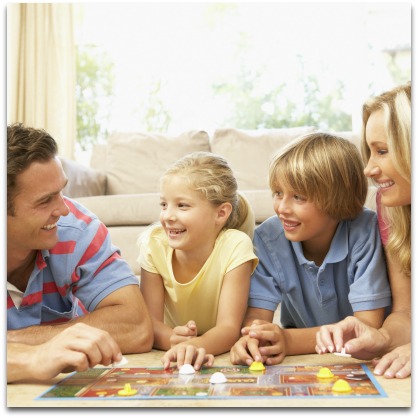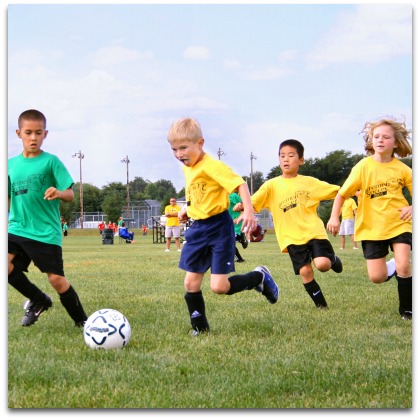 Good game, high-5; Good game, high-5; Good game, high-5; Good game, high-5…
Good game, high-5; Good game, high-5; Good game, high-5; Good game, high-5…
At 8 years old, being a good sport was about hiding your disappointment when you lost and not bragging too much when you won. It was exhibited in a line of little girls delivering hand-slaps and “good games” before running to the coolers behind the bench to claim grape sodas.
As I got older, sportsmanship became about more than losing a game without throwing a temper tantrum. It became about handling yourself, on and off the field, with style and dignity no matter what the outcome.
Now I’m a parent with a super-competitive child and sportsmanship has never been more important.
My oldest has always been highly competitive. He needs to win. He must be first. Otherwise, he can get very frustrated. He has always been this way. In pre-school he used to bolt down as much food as he could and then say he was full, even though he had half his lunch left, so that he could be first to the washing up station.
This is terribly ironic considering that from the minute we decided to have children my husband and I were determined to raise our children to be non-competitive good sports.
None of this “Second place is the first loser,” or “Winning isn’t everything; it’s the only thing,” mentality for us. We emphasized fun over winning, asking him “Did you have fun?” before we asked anything else.
Yet here we are with a 10-year-old who will do anything to win – including cheat – and cries like his heart is broken when he loses.
Nature vs. Nurture. The struggle is real, y’all.
 We went to our pediatrician with our concerns about Evan’s racing through lunch and other places where his competitive streak was coming out in not-so-great ways. Our lovely doctor advised us to start teaching Evan about sportsmanship.
We went to our pediatrician with our concerns about Evan’s racing through lunch and other places where his competitive streak was coming out in not-so-great ways. Our lovely doctor advised us to start teaching Evan about sportsmanship.
It turns out sportsmanship isn’t just about how you handle winning and losing. Good sportsmanship is:
- Playing fair
- Respecting the rules
- Respecting the people in charge, like coaches or referees
- Respecting the other players
Coaches and psychologists further define sportsmanship as, “an awareness that on the field or the sideline, your actions, attitudes, and behavior affect everyone else, how they play, and how they enjoy the game.”
So how do we teach this respect, fairness, and grace to our children?
Here are 4 ways to start you down the path to good sportsmanship and raising a good sport.
#1 Play games with them
 Sportsmanship is learning how to have grace under pressure and developing a sense of fairness and equality. Developing that grace and equality requires practice.
Sportsmanship is learning how to have grace under pressure and developing a sense of fairness and equality. Developing that grace and equality requires practice.
So, sit down with them and play games. As you play with them take this opportunity to mindfully model sportsmanship. You show your respect for the rules, enforce the rules, and show respect for the other players. Any game you choose to play is fine. (Here is a list of 60 board games that are both fun and educational if board games are your thing).
And, tempting as it may be, don’t let them win all the time. Learning how to lose is important in developing sportsmanship. Are there times I let my boys win while we are playing Candyland? Sure. But I also let them lose. Then I coach them through some sportsmanship self-talk.
“You played a good game!”
“I thought it was neat when you drew two double purples in a row.”
“I got lucky here when I ….”
“I had fun playing with you.”
This kind of talk becomes their inner voice on and off the field.
If you have a child who is too focused on winning – even to the point of trying to cheat – find the games that doesn’t need a score or where winning isn’t the only objective. This keeps them from making the focus “winning” and moves the goal into “having fun.”
You can also learn sportsmanship by watching sports or other performances on television and look for examples of sportsmanship. Point out what makes someone a good sport. As importantly, point out when someone isn’t.
Steven Ungerleider, a child psychologist, recommends using these incidences as a springboard into conversations about what sportsmanship is and what it means when you are a “good sport” versus a “bad sport.” If you need some examples just pull up some videos of John McEnroe’s more spectacular rants.
Having these conversations shapes how our children view fairness and competition. It enriches their definition of sportsmanship.
#2 Sign them up for activities that emphasize teamwork
 Playing on a team or joining a group gives your child others to commiserate with or celebrate with. Having that network of support and peers to mirror also helps develop sportsmanship.
Playing on a team or joining a group gives your child others to commiserate with or celebrate with. Having that network of support and peers to mirror also helps develop sportsmanship.
Soccer, field hockey, and softball are classic team sports that teach sportsmanship. Often those leagues even have a sportsmanship focus and policy. But it doesn’t have to be a sport in order to teach teamwork and sportsmanship!
Orchestra, dance, and theater are great team activities that teach sportsmanship. There are even First Lego Robotics teams your child can join. Plus “success” doesn’t necessarily equal “winning.” Success is each individual doing their part to their best ability and seeing it come together as a whole.
That kind of teamwork experience reinforces the “ripple effect” aspect around attitudes and behaviors of sportsmanship. When you are aware that how you act can affect the success of the entire group you choose to behave differently. You become a better sportsman.
#3 Go through the play-by-play
 I got something wrong when we were trying to raise Evan to be a non-competitive child.
I got something wrong when we were trying to raise Evan to be a non-competitive child.
See, I thought teaching sportsmanship meant downplaying success and failure, and only talking about fun. It doesn’t.
Good sportsmanship celebrates and analyzes the successes and the losses along with talking about fun.
I do this using a technique called appreciative inquiry. Appreciative inquiry is a way of analyzing situations using positively worded statements to talk about tough topics.
For example, saying What can I improve on instead of What went wrong makes confronting failure feel less unpleasant and more constructive. (David Cooperrider has a great book on this, published in 2007.)
Appreciative inquiry is also a great tool for developing gritty kids. I use it with Evan to help him express the very powerful emotions he is feeling in a positive and productive way. An appreciative inquiry conversation after a little league game would look like this:
Me: Hey! You won (or lost)! (Acknowledge the outcome.)
Evan: Yeah, I did!
Me: What do you think was your best moment? (Look at what went right.)
Evan: I think when I caught that pop-fly and got that kid out. Or it was when I slid into third base.
Me: That was pretty cool. Why do you think those were your best moments? (Why did they go right?)
Evan: I was really focused on the ball and I could see it all the way into my glove. And when I slid into third I was kind of nervous that I wouldn’t make it all the way, but I did and it worked!
Me: So, what would you want to go better for next time? (What didn’t work?)
Evan: Well, I don’t think I did that great a job hitting today, actually.
Me: Oh, okay. What do you think you want to do about that next time? (How can you improve on what went wrong?)
Evan: I’m going to ask the coach if I can have some extra hitting practice next week.
Appreciative inquiry allows them to celebrate their successes while learning to build upon them and allows them to find the little successes inside their failures. Regardless of whether he won or lost there were still moments in every game that Evan can be proud of.
And he begins to learn that losing doesn’t mean that everything he did was worthless. Finding that worth is a stepping-stone to developing the grace and respect sportsmanship is built upon.
#4 Compete against yourself only
 There is a lot of emphasis in society to be The Best and A Winner. The television is loaded with sports designed to show you who is The Best and who is Not. It’s hard for a kid, especially a highly competitive child, to play a game and have goals other than winning.
There is a lot of emphasis in society to be The Best and A Winner. The television is loaded with sports designed to show you who is The Best and who is Not. It’s hard for a kid, especially a highly competitive child, to play a game and have goals other than winning.
One way to build sportsmanship in this kind of environment is to stop comparing yourself against others and start comparing you against yourself. Ironically, swimming, track, and other sports that involve racing are great ways to teach this to children.
This is why we signed Evan up for swim team. He isn’t the best and he’s never won a race, but he compares his previous times to his current time and finds success there. He can celebrate his own growth along with the successes of his friends in their races.
Because Evan was competing against himself he found that he wanted to follow the rules, treat others with respect, and act with grace and dignity. Sportsmanship became second nature.
 The 2-Minute Action Plan for Fine Parents
The 2-Minute Action Plan for Fine Parents
Here are some questions to think about during your 2-minute contemplation.
- How do your kids react to losing? How do they celebrate winning?
- How do you react to winning and losing? When you are watching a game on television, what do you say about how the game is played?
- What kinds of sports or activities do your kids like?
- Do they bend the rules in order to win?
- Can they see their successes inside the losses?
The Ongoing Action Plan for Fine Parents
Raising a child who is a good sport isn’t something that happens overnight. Here are some things to consider over the long haul that will help you succeed.
- How can you use appreciative inquiry to help your child process their wins and loses to build respect for the games they play and the people they play against, as well as grace under pressure?
- How can you model being a good sport? What activities can you do with your child that will help him develop a sportsmanship-centered internal monologue?
- What are some team-oriented sports or clubs that your child can join? Or are they already on a team where you can re-shape or modify their definition of success?
I love #1 Mindy. As a counselor, I’m often meeting kids who struggle with losing and what I hear from their parents and/or their daycare providers / teachers is that they avoid games at all cost. They dislike playing games with these kids so much because it’s such a negative experience (screaming, crying, aggression, arguments, desperation to play again and win this time, etc.). When you actually take the time to play games with them, it can be very challenging, but it’s also so rewarding to watch kids go from throwing the board at me to giving me a high five when they’ve lost a game. It takes a lot of hard work (and some skilled dodge ball moves) but it’s so rewarding in the end.
As a side bar, I’m also wondering how you started in Iowa and ended up in Switzerland. I’m from South Dakota so reading your little bio really intrigued me 🙂
Hi! We are actually just moving back to DC from Switzerland this month. My husband had gotten an exchange assignment from DC to Basel and so we picked up the family and moved for 2 years. It was amazing and the best thing we’ve ever done.
Thank you for your kind comments. I could not agree more about the importance of playing games with your kids to teach sportsmanship. It can be very frustrating when they lose and the tantrum and tears come, but it is so much better for them in the long run.
I really love this article. I teach in a small school with 24 students R-7 in rural South Australia. Many of our students struggle when they are not first or the winner. This article has given me some extra ideas and a renewed commitment that I’m on the right track when we have discussions about good sportsmanship. Thanks for the timely reminder and confidence boost.
So glad you found the article useful, Jo. Thanks for letting us know.
Good luck with the little ones in your care… it’s so great to hear that you are focusing on teaching good sportsmanship in addition to your core teaching. That’s awesome. Keep up the good work!